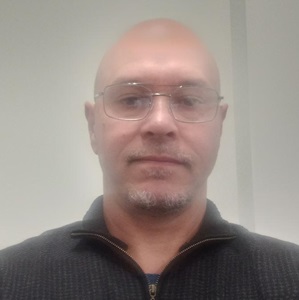
Nicholas Leidig
‘The relationship between chronic disease and intergenerational trauma in Aboriginal population groups’
University of Adelaide, SA
Awarded 2024
Co-funded by the Rotary South Australia Centenary Indigenous PhD (Rotary Club of Adelaide)
“I have sadly been aware throughout my personal and working life of the increased risk of exposure to trauma and mental disorders impacting on Aboriginal and Torres Strait Islander peoples. I have also observed that many Aboriginal and Torres Strait Islander peoples also must manage and receive treatment for a range of ‘preventable’ chronic diseases.”
Researcher Profile
I am a Ramindjeri man who has spent most of my adult life living and working on Kaurna land (Adelaide). My interest in Aboriginal health and education came primarily out of the unanswered questions I had growing up. I say ‘unanswered’ because the mainstream schooling system and curriculum in the 70s and 80s was ill-equipped to answer the questions I had, let alone address the gamut of Aboriginal issues. Regardless, for an Aboriginal kid at the time, I am the first to admit that I had somewhat of a privileged education that was supported by my loving parents. My non-Aboriginal father was a dedicated high school teacher, and my Aboriginal mother had passionately devoted herself to working in Aboriginal early childhood education.
During my working life over the past 30 years, I have primarily worked in Aboriginal health, education and other roles working with Aboriginal and Torres Strait Islander peoples. The only exceptions are my periods of service in the Royal Australian Navy and Army Reserves. In my spare time, I enjoy camping, tennis and spending time with family.
Project Summary
Most people would be aware of the ‘Closing the Gap’ campaign. The Australian Government’s national strategy that aims to improve the health and life outcomes of Aboriginal and Torres Strait Islander peoples. A key target is to reduce the gap in life expectancy between Aboriginal and Torres Strait Islander people and non-Aboriginal Australians, currently estimated by the Australian Bureau of Statistics (ABS) at 12 years for males and 10 years for females. A major contributor to this life expectancy gap for adults is due to chronic diseases, such as heart diseases, diabetes, liver diseases, chronic lower respiratory disease, cerebrovascular diseases and cancer.
Many of these chronic diseases are more common among Aboriginal and Torres Strait Islander people than among non-Aboriginal Australians, and sadly, occur at a younger age. It is well recognised that the Indigenous burden of disease is influenced by present day social determinants of health and the intergenerational effects of a colonial past. Some studies have gone further and found a link between intergenerational trauma and the poor health outcomes impacting on Aboriginal peoples.
Although it is broadly acknowledged that due to historical determinants Aboriginal Australians suffer more forms of trauma than non-Aboriginal Australians, there is still limited studies and data to draw from. This leads my research to examine the relationship between chronic diseases among Aboriginal and Torres Strait Islander people (or sub-populations) suffering from differing forms of trauma, especially intergenerational trauma.